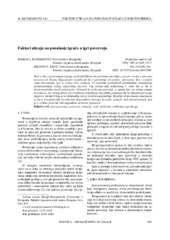Please use this identifier to cite or link to this item:
https://rfos.fon.bg.ac.rs/handle/123456789/1801Full metadata record
| DC Field | Value | Language |
|---|---|---|
| dc.creator | Kuzmanović, Marija | |
| dc.creator | Panić, Biljana | |
| dc.date.accessioned | 2023-05-12T11:14:51Z | - |
| dc.date.available | 2023-05-12T11:14:51Z | - |
| dc.date.issued | 2018 | |
| dc.identifier.issn | 0040-2176 | |
| dc.identifier.uri | https://rfos.fon.bg.ac.rs/handle/123456789/1801 | - |
| dc.description.abstract | Rad se bavi istraživanjem uticaja različitih faktora na ponašanje učesnika u igri poverenja u uslovima neizvesnosti. Brojni eksperimenti su pokazali da se ponašanje investitora i poverioca, kao i rezultati same investicione igre u velikoj meri razlikuju od rezultata predviđenih standardnim ekonomskim pretpostavkama čistog sopstvenog interesa. Cilj istraživanja prikazanog u radu bio je da se eksperimentalno utvrdi uticaj pola i sklonosti ka riziku na poverenje, a samim tim i na visinu ponude investitora, ali i uticaj društveno vrednosne orijentacije na odluku primaoca da na ukazano poverenje odgovori na način koji se u ekonomskoj teoriji smatra iracionalnim. Rezultati eksperimenta ukazuju na to da su investitori čak i u uslovima neizvesnosti i averzije ka riziku, pokazali visok nivo poverenja, koje je u velikom procentu bilo nagrađeno od strane primaoca. | sr |
| dc.description.abstract | In this paper the effect of various factors on the behaviour of participants in the trust game under uncertainty was examined. Numerous experiments have shown that the behaviour of investors and receivers, as well as the results of the investment games themselves, differ greatly from the results predicted by the standard economic theory based on the assumption of rational self-interests. The main purpose of this research was to experimentally determine the influence of gender and risk preferences on the trust and consequently, on the amount of investor's offer. In addition, the aim of the research was to determine the influence of the social value orientation on the receivers' decision to respond irrationally (in the meaning of economic theory) to the given trust. The results of the experiment indicate that investors, even under uncertainty and risk aversion, showed a high level of trust, which was largely rewarded by the receiver. | en |
| dc.publisher | Savez inženjera i tehničara Srbije, Beograd | |
| dc.rights | openAccess | |
| dc.rights.uri | https://creativecommons.org/licenses/by/4.0/ | |
| dc.source | Tehnika | |
| dc.subject | ulaganje | sr |
| dc.subject | rizik | sr |
| dc.subject | poverenje | sr |
| dc.subject | igra poverenja | sr |
| dc.subject | društveno vrednosna orijentacija | sr |
| dc.subject | trust | en |
| dc.subject | The trust game | en |
| dc.subject | social value orientation | en |
| dc.subject | risk | en |
| dc.subject | investment | en |
| dc.title | Faktori uticaja na ponašanje igrača u igri poverenja | sr |
| dc.title | Factors affecting behaviour of the participants in the trust game | en |
| dc.type | article | |
| dc.rights.license | BY | |
| dc.citation.epage | 566 | |
| dc.citation.issue | 4 | |
| dc.citation.other | 73(4): 559-566 | |
| dc.citation.rank | M51 | |
| dc.citation.spage | 559 | |
| dc.citation.volume | 73 | |
| dc.identifier.doi | 10.5937/tehnika1804559K | |
| dc.identifier.fulltext | http://prototype2.rcub.bg.ac.rs/bitstream/id/485/1797.pdf | |
| dc.identifier.rcub | conv_40 | |
| dc.type.version | publishedVersion | |
| item.cerifentitytype | Publications | - |
| item.fulltext | With Fulltext | - |
| item.grantfulltext | open | - |
| item.openairecristype | http://purl.org/coar/resource_type/c_18cf | - |
| item.openairetype | article | - |
| Appears in Collections: | Radovi istraživača / Researchers’ publications | |
Page view(s)
10
checked on Dec 28, 2025
Download(s)
4
checked on Dec 28, 2025
Google ScholarTM
Check
Altmetric
This item is licensed under a Creative Commons License


